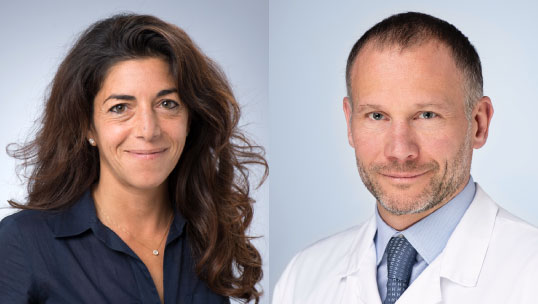29.09
2021
Evolving strategies in cancer treatment
Professor Lana Kandalaft and Professor Olivier Michielin share their expert vision on how cancer treatment has evolved and how it will continue to evolve and become more and more personalised to each patient and each tumour.
Standard of care in cancer treatment has taken a new turn in recent years. Increasing numbers of immuno-oncology drugs and targeted therapy approaches are now used to treat patients. Depending on the type of cancer, its genetic make-up or the immune environment of the patient, treatments other than chemo- or radiotherapy can be prescribed. Immunotherapies can use multiple approaches to attack the cancer, for example by removing the brakes as is the case with immune checkpoint blockade treatments, or by stimulating our immune system.
These developments have led to tremendous advances in cancer care, to the extent even that immunotherapy has replaced chemotherapy in standard of care therapy in some types of cancer. However, chemotherapy and radiotherapy continue to be used either after other treatments such as surgery, before, or in combination.
Immunotherapy, cell therapy and cancer vaccines are very exciting approaches to treating patients because they empower the immune system to recognise and attack the tumour. The diversity of cancers cells, their specific mutations and their environment make the treatment of every patient unique to them. It is this singularity of care that has placed cancer treatment at the forefront of today’s personalised medicine revolution.
Currently, many patients still do not respond to or are not cured by the most innovative of those immunotherapies. Cell therapy offers an alternative, where tumour-infiltrating lymphocytes (T cells), selected for their ability to recognise and kill the tumour, are isolated and extracted from the patient and grown in the lab before being infused into the patient. If the patient does not possess T cells that spontaneously recognise the cancer, T cells can also be accordingly engineered and grown in the lab for infusion.
Vaccines, on the other hand, are an interesting strategy for preventing relapse. Patients can be vaccinated the moment they are cancer-free with personalised vaccines that teach the immune system to recognise and kill any reoccurring cancer cells. The optimal personalised use of all these strategies requires the assembly and interpretation of highly complex data sets obtained from deep analyses of the tumours. Such data collection and analyses are already underway.
Many questions still need to be answered before such personalised treatments can become standard of care. They are very complex to produce, but this challenge is today central to the global cancer community's current preoccupations. CAR T-cell therapy has already become a standard of care for some haematological cancers and is paving the way for other cell therapies.
We know that in future, treatment will become increasingly personalised. Based on the unique characteristics of both the patient and the tumour, a treatment will be proposed or made to measure. We have already seen that happening in the clinic with the genetic analysis of tumours for targeted therapy. The immune environment will increasingly need to be considered so that we can choose the most potent option for each patient. By narrowing the gap from bench to bedside, our unique integrated environment at the Department of oncology UNIL CHUV and the Ludwig Lausanne branch firmly aims to bring new, innovative and personalised treatments to patients faster.
Biography of the authors
Prof. Lana Kandalaft is one of the key members of the Swiss Cancer Center in Lausanne Switzerland. She is currently the Chief of service of the Center of Experimental Therapeutics, an integrated structure of clinical services, manufacturing facilities and laboratory platforms in the Department of Oncology, at the CHUV and the Swiss Cancer Center Lausanne aiming to take new cellular therapies from the lab to the clinic. She also is Associate Director of clinical translation at the Ludwig Institute for Cancer Research, Lausanne Branch, Associate Professor at the University of Lausanne as of August 1st, 2021 and Adjunct Assistant Professor at the University of Pennsylvania, School of Medicine, and Associate Professor at the University of Lausanne, School of Biology & Medecine.
Prof. Olivier Michielin works at the Department of oncology of the Lausanne University Hospital (UNIL-CHUV) where he is currently head of the melanoma clinic. Prof. Olivier Michielin research is mainly focused on translational oncology, developing new molecularly defined therapeutic approaches based on original bioinformatics techniques developed in his laboratory, as well as melanoma clinical trials at the Lausanne University Hospital. In 2016, Prof. Olivier Michielin was appointed Head of the Center for Precision Oncology within the Department of oncology.
